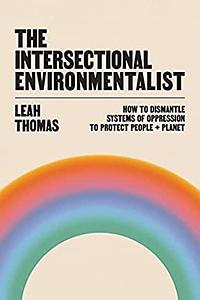Take a photo of a barcode or cover
569 reviews for:
The Intersectional Environmentalist: How to Dismantle Systems of Oppression to Protect People + Planet
Leah Thomas
569 reviews for:
The Intersectional Environmentalist: How to Dismantle Systems of Oppression to Protect People + Planet
Leah Thomas
challenging
hopeful
informative
inspiring
reflective
medium-paced
adventurous
hopeful
informative
reflective
medium-paced
Thanks to NetGalley and the publisher of this book for the ARC! I loved this book a lot. Firstly, it provided a lot of concrete examples so that people who were unclear of meanings or who might not get concepts as they are defined could still understand them with the help of the examples. I loved the IE pledges, the questions within (centering voices from the IE movement) and at the end of each chapter for deeper connection and consideration of what was learned while reading. Overall, I think this book is a fantastic read and should be something that everyone picks up to better understand why and how to be an Intersectional Environmentalist.
informative
reflective
medium-paced
challenging
emotional
hopeful
informative
inspiring
medium-paced
challenging
hopeful
informative
medium-paced
challenging
informative
inspiring
challenging
informative
reflective
fast-paced
It started off strong but very abruptly felt disorganized and shallow. The beginning really set up the stage for what intersectionality means, why it matters, and then how to translate that into the environmental movement. But then the last chapter was just like “here’s three things impacting the planet! Bye!” And then a toolbox made up of quotes from various people on different topics. This book could have either been an informative blog post or a significantly longer book to sufficiently dive into all of the things it brought up and then left. I think this is a great starting point for reframing our approach to climate activism and organizing (especially if you’re brand new to all of these concepts), but I’ve ended this book wishing I had just read other books more deeply focused on specific topics under this umbrella.
There is a person in my life with whom I share many values, but he consistently dismisses race and gender as things about which he ought to be concerned. Because he doesn’t consider himself to hold racist beliefs, he doesn’t understand why we’ve all been talking about race when we really ought to be focused on climate change. Since I am a known radical, he has largely dismissed my insistence that climate change can’t be solved without also dismantling patriarchy and white supremacy. While my constant use of phrases like “dismantle systems that uphold white supremacy” and “gender is a social construct” elicited anything from rolled eyes to indulgent chuckles, I had created a tiny crack in his assurance that there is no vast white male conspiracy to control the world. The turning point came in the aftermath of January 6th when he started to see for himself the relationship between racism and the erosion of voting rights. Without the right to vote, there is no way to pressure elected officials into caring about the health of the planet. He began to consider that I might not just be an over educated nutter.
During this period of open mindedness, I have been reading Leah Thomas’ The Intersectional Environmentalist: How to Dismantle Systems of Oppression to Protect People + Planet and sharing information and thoughts with him. I’ve been able to introduce both of us to BIPOC environmental activists. While he will probably never understand what I mean when I say gender isn’t real, we’ve had some very good conversations about the intersections of racism and environmental policy. Reading Leah Thomas’ book has helped me articulate more clearly my belief that saving the planet cannot be separated from dismantling systems of oppression.
The Intersectional Environmentalist gave me a much better understanding of the scope of intersectional environmentalism, and how I can be more intersectional in my advocacy and work. Thomas brings in her own experience and perspective, and reaches out to bring in the voices of activists from other BIPOC and queer communities. In addition to bringing in multiple voices and viewpoints, Thomas also provides an expansive tool kit with resources to learn more about specific issues and communities.
I received this as an advance reader copy from Little, Brown and Company via NetGalley. My opinions are my own.
During this period of open mindedness, I have been reading Leah Thomas’ The Intersectional Environmentalist: How to Dismantle Systems of Oppression to Protect People + Planet and sharing information and thoughts with him. I’ve been able to introduce both of us to BIPOC environmental activists. While he will probably never understand what I mean when I say gender isn’t real, we’ve had some very good conversations about the intersections of racism and environmental policy. Reading Leah Thomas’ book has helped me articulate more clearly my belief that saving the planet cannot be separated from dismantling systems of oppression.
The Intersectional Environmentalist gave me a much better understanding of the scope of intersectional environmentalism, and how I can be more intersectional in my advocacy and work. Thomas brings in her own experience and perspective, and reaches out to bring in the voices of activists from other BIPOC and queer communities. In addition to bringing in multiple voices and viewpoints, Thomas also provides an expansive tool kit with resources to learn more about specific issues and communities.
I received this as an advance reader copy from Little, Brown and Company via NetGalley. My opinions are my own.
challenging
informative
reflective
medium-paced
hopeful
informative
inspiring
reflective
medium-paced







